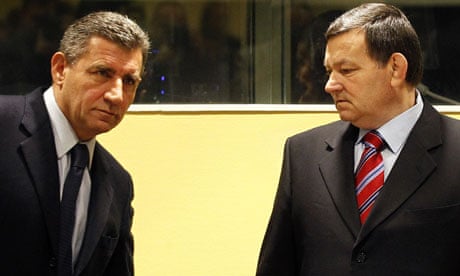An appeal court at The Hague war crimes tribunal has overturned the convictions of two Croatian generals for the expulsion of ethnic Serbs in 1995, in a ruling hailed in Croatia as a vindication of its war of independence but denounced in Serbia as evidence of bias.
The court ordered the immediate release of Ante Gotovina, a former military commander, and Mladen Markac, a former head of special police, who had been serving jail sentences of 24 and 18 years respectively.
The verdict revealed deep divisions inside the tribunal. It threw out last year's trial verdict on the two men, but only by a 3-2 majority. The two dissenting justices were scathing. One called it "simply grotesque" and contradictory to "any sense of justice".
The two generals remained impassive as the verdicts were read out but the decision was greeted with cheers and applause in the public seats in the chamber and with celebrations around Croatia, where Gotovina is seen as a national hero and an embodiment of the country's fight for independence. Thousands of people took to the streets and children were sent home from schools. After collecting their prison possessions, the two generals were driven in Croatian government cars to Rotterdam airport for the flight back to Zagreb.
Croatia's president, Ivo Josipovic, said: "The verdict confirms everything that we believe in Croatia: that Generals Gotovina and Markac are innocent."
Gotovina's defence lawyer, Greg Kehoe, said the appeal verdict demonstrated that Croatia's Operation Storm in 1995 to regain control over the last Serb-run enclaves on its territory had been entirely legitimate under international law.
"This judgment vindicates that operation as a proper and just attempt to bring back that land into Croatia. More importantly, it vindicates what kind of soldier General Gotovina was," Kehoe said.
The appeal verdict caused outrage in Serbia, where President Tomislav Nikolic condemned the verdict as "political" adding it "will open old wounds."
Early reports suggested Serb officials may boycott an event planned by the Hague tribunal next week in Belgrade.
By mostly majority verdicts the judges said the original trial had erred significantly in ruling that Croatian artillery had illegally shelled four Serb-held towns – Knin, Benkovac, Gracac and Obrovac. In particular, it found that the criteria used – that any shell that landed more than 200 metres away from a military target must have been fired indiscriminately – was arbitrary and "devoid of any specific reasoning".
More controversially, the majority verdict said that there had been no "joint criminal enterprise", or conspiracy, to force out the Serbs from the Krajina region. An estimated 20,000 fled their homes and 600 were killed, many in summary executions. [see footnote]
In one of the two dissenting verdicts, Fausto Pocar, argued there was much more evidence presented at last year's trial to suggest that one of the aims of Operation Storm was to force the Serbs out, including transcripts of a meeting on the island of Brijuni just before it was launched, presided over by the then Croatian leader, Franjo Tudjman.
Pocar wrote that the majority view on the Brijuni meeting was "simply grotesque."
The defence lawyer, Kehoe said. "There were crimes, very heinous crimes that need to prosecuted." But he said that by vindicating the conduct of Operation Storm, the tribunal had "put itself on the right side of the rule of law".
The tribunal, set up by the UN in 1993, has been repeatedly criticised for the slow pace of its proceedings. The fact that Gotovina spent almost seven years in prison in The Hague between his arrest by Spanish police in Tenerife and Friday's ruling islikely to bring fresh scrutiny.
